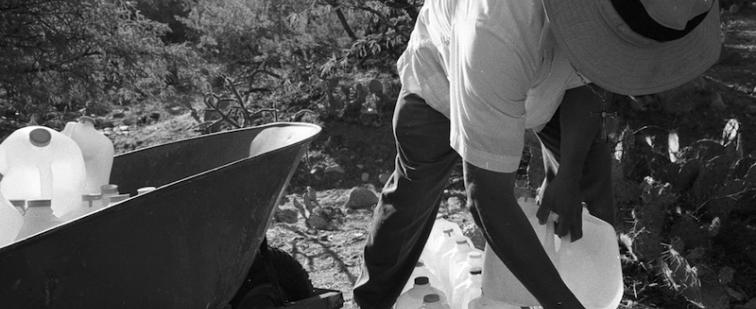Home
Although the passing of a new constitution represented a moment of unity between Ecuador's popular movements and the electoral left, these two entities have clashed recently over the question of environmental protection-showing that they are hardly synonymous and sometimes not even allies. After the Constitution was ratified, Ecuadoran president Rafael Correa began a public campaign to pass legislation that would expand the operations of gold-, silver-, and copper-mining corporations in the Amazon and the southern highlands around Cuenca, as well as initiate new mining sites in the northern highlands. Moving away from the firm anti-neoliberal rhetoric he used on the 2006 campaign trail, Correa described his vision of a socially responsible mining sector whose profits would be harnessed to break the country's dependence on extractive industry.
The North American Free Trade Agreement (NAFTA) has, to a significant extent, defined the relationship between the three North American nations over the last fifteen years. NAFTA was sold on the promise that it would bring more and better jobs and faster growth to the region and reduce emigration from Mexico to the United States and Canada. While trade and investment flows did increase, NAFTA did not create more net trade-related jobs and those that it did were very often less stable, with lower wages and fewer benefits. Instead, increased trade largely benefited the corporate elite in all three countries. Income inequality has also grown in the region. We believe that the trade liberalization and investors' rights provisions contained in NAFTA were important contributors to these results.
On August 12, 2009, Mapuche activist Jaime Mendoza Collío, 24, was shot in the back by a police officer during a symbolic land occupation of the San Sebastian ranch outside the town of Angol, Chile. The killing - and the reactions to it - reflects a deepening crisis in the relations between the Chilean state and the 900,000-member Mapuche nation, the largest indigenous group in Chile.
Mapuche political leaders are taking the logic of land reform one step further and demanding regional autonomy for Wallmapu, as Mapudungun speakers call the Araucanía. In an appearance on the television talk show Tolerancia Cero, a spokesman for the Council of All Lands (Consejo de Todas las Tierras) Aucán Huilcamán, proposed the creation of an autonomous, self-governed area south of the Bío Bío river. Huilcamán cited the rights to political self-determination and regional autonomy granted by the 2007 UN Declaration on the Rights of Indigenous Peoples as the legal basis for the demand.
The Inter-American Commission of Human Rights (IACHR) recently expressed concern over revelations that Colombia's Administrative Security Department (DAS), the powerful intelligence arm of the president's office, had spied on IACHR Commissioner and Special Rapporteur on the Rights of Women Susana Villarán and her delegation during a June 2005 visit to Colombia. The Uribe administration's interest in spying on that mission points to its concern that an international investigation might highlight Colombia's abysmal women's rights record, including the underreported use of sexual violence as a favored weapon of war by the country's many armed groups.
The U.S. press tends to portray left-leaning Latin American governments as hotbeds of anti-Semitism. In the case of Venezuela, this storyline has been promoted in three key ways: (1) attributing anti-Semitic acts or statements by private citizens to the government, (2) conflating legitimate criticism of Israeli policy with anti-Semitism, and (3) relying on press statements by U.S.-based Jewish organizations at the expense of Venezuelan Jewish organizations.
The members of Centro Campesino, a cooperative in Guatemala’s Petén region, are fighting to recover their land. Their displacement, their struggle, and their inability to protect their community, Yaxchilan, reveal the surprising ways that both export-led development plans and conservation programs can disregard the interests of indigenous and traditional communities. For conservation groups, this oversight can lead to a failure to ally with the only communities that may effectively stop mining, petroleum exploration, hydroelectric dams, and monoculture crops that destroy the environment.
The agricultural sector that is emerging has fewer, bigger, more industrial farms. It relies on imports of pesticides more than ever. And the quality of its famed meat is being traded for cheap production. It is a trend that will be difficult to reverse. Cattle farming takes such a large up front investment that once a farmer sells his herd, it is hard to get it back. Historically, Argentines have treated cattle as walking bank accounts—the word for the industry, ganaderia, shares the same root as the verb “to earn.” For many farmers, the bank is broken. They are now fully dependent on the volatile international prices of soy and other crops.
The announcement on June 25 that Spain will begin to limit its application of universal jurisdiction garnered no more than a humble blip in international media coverage. The principle, which asserts that certain crimes are so egregious that they are an affront to all humanity and therefore prosecutable by any nation, is at the center of fierce philosophical debate in international law. But for survivors of genocide in Guatemala, universal jurisdiction has represented something much more tangible—an important avenue for justice against the lingering impunity left in the wake Latin America's dirty wars.
The most notable instance of a massive and successful social protest in Puerto Rico in recent years has been on the island of Vieques between 1999 and 2003. This was a rare case in which Puerto Ricans were able to overcome their partisan divisions to end the U.S. Navy's 60 years of training on this small, 51-square-mile island off the main island's east coast. Part of the reason for the Vieques victory, including gaining support from some influential U.S. politicians, was that leaders framed the protest in terms of human rights, public health and environmental degradation rather than Yanqui imperialism.












